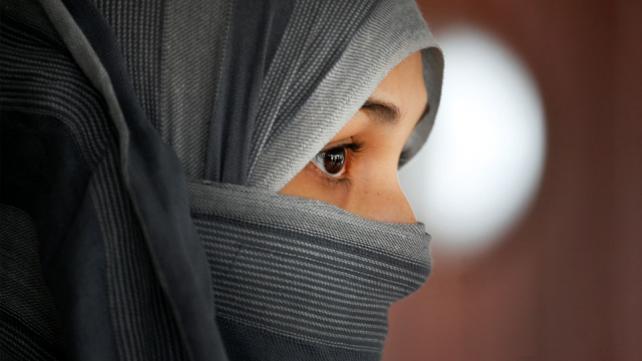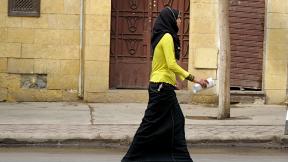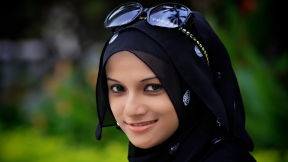
While Hijab is an obligation clearly ordained in the Quran and Sunnah, it is only one of many Islamic obligations.
Yet, some Muslim organizations have heated debates about it, and sometimes practice unacceptable behavior towards those Muslim women who do not wear Hijab, to the point of excluding them or making them feel uncomfortable.
How can Muslim activists make their organizations and communities places where the teachings of Islam are upheld, but Muslims, men and women, are not excluded? Where Hijab does not become a flash point? Below are some tips.
1. Do not judge
This is key for activists. While some Muslims in a given setting may judge non-Hijabis, activists and key figures in organizations and communities must never fall into this kind of behavior.
Remember that we don't know a person's background: maybe the sister doesn't know Hijab is an obligation; maybe she's from a culture where it is not practiced; maybe she is from a family that has forced her to take it off; or from a non-practicing family, or even a family that is hostile to Islam.
Harshness will lead non-Hijabi women to turn away from other Muslims, and in many cases turn to non-Muslims.
“If they look around and they see Muslim activist women who are very negative and exclusionary and overly critical then they are not going to make them their friend,” says Sharifa Alkhateeb, vice-president of the North American Council of Muslim Women. “If they [activist Muslim women] want to influence the behavior of young women, they have to, before anything else, become their friend.”
Which is the next tip.
2. If you're a Muslim sister, be a friend
“What young Muslim women need more than anything else is friendship,” says Alkhateeb.
She explains that most of the time, they feel alienated and cannot befriend their parents, who may reject their views or cannot relate to them. This leads to young women searching for solace in friends outside the family.
This is why it is crucial that activist Muslim women extend a warm, friendly hand to young Muslim women, whether in organizations or in the Muslim community in general.
Alkhateeb also stresses that being a friend is not just speaking the words of friendship.
“They think it's enough to say I love you, and I care about you,” she says. But real friendship and caring “comes through living with the person, being around the person.“
3. If you're a brother, be polite, treat her with respect
That essentially means practicing a brother's Islamic duty to lower his gaze and guard his modesty. It also means not making the sister feel uncomfortable.
This includes not looking down at her, making rude gestures or comments about her lack of Hijab.
4. Encourage her to participate in Islamic activities
“It's only by mixing in the right company that someone who is contemplating Hijab will have the strength and courage to make the final act,” says Kathy Bullock, who began wearing Hijab two weeks after her conversion to Islam.
This means that the open and welcoming attitude can't be reserved to just a one-shot activity, like a dinner or an orientation session. It means regular contact with other Muslims.
One method is a Halaqa. Most MSAs and Muslim communities offer a variety of these, from mixed brother sister Halaqas, to gender-specific ones.
A sisters only Halaqa can allow for more comfortable and open discussion and relations, and better bonding time, which can strengthen friendship and sisterhood.
5. Have her research the question for a presentation
This was an approach Abdalla Idris Ali, Director of the Center for Islamic Education in Kansas City, Misouri and a former Muslim high school principal, used for a student who did not wear Hijab. He asked her to do a presentation on the topic.
This method could be effective because it provides the basic information, without any judgment or harshness. It is something the individual does on her own.
This method can also be used for other topics, to encourage Muslims-i.e. if a brother has missed Salat ul Juma a few times, a presentation on its importance could serve as a reminder.
6. Protect her from those who will cause her harm
This is tricky but will be necessary. In many Islamic organizations and Muslim communities, you will find those who wish to implement Islam using what Alkhateeb describes as the “baseball bat” approach: with harshness.
This must be resisted. If such a situation arises, fellow brothers and sisters should stand by the non-Hijabi sister. It will not only serve to be a “buffer” for the harsh comments, but it will indicate her importance as part of the Muslim community/organization, and in the long run, will be conducive to giving her advice.
7. Gently and kindly explain to other Muslims not to judge her
Just as it is important for Muslims to remind each other of their obligations to Allah, it is also important that activist Muslims gently explain to others not to use the “baseball bat” approach. Talk to them with proof from the Quran and Sunnah-that Islam calls for inviting people to the good with wisdom; that the Prophet (peace and blessings be upon him) was not harsh and intolerant in the face of others' weaknesses. Also stress the gradual approach. Use many examples, as it seems the Muslims who want to use the harsh approach often feel this is the Islamic way.
By providing solid examples from the Sunnah, they may become convinced to change their way.
If this does not work, get a trusted scholar or knowledgeable Muslim or Muslima to address them who both sides listen to and trust.
8. Emphasize building faith first
Islam was sent to the Prophet gradually, and Muslims today must also implement Islam in this manner.
That means that before anyone speaks to a sister about Hijab, more important aspects of the faith have to be emphasized: the basic beliefs, pillars, the importance of praying five times a day, fasting in Ramadan, etc.
This gradual approach builds Iman and conviction, and in fact was the method used by the Prophet.
“We fail to see any Ayah (verse of the Quran) pertaining to Hijab in the entire Makkan revelation that was given to the Prophet, that's almost 13 years. The injunctions about more detailed aspects relating to the righteous Muslim community were revealed during the Medinan period. Some in the middle, and later part of that period,” says Jamal Badawi, a member of the North American Fiqh Council.
“This is a revealing lesson for us because it shows that Allah (s.w.t.) knew in advance what injunctions He wanted to reveal,” he adds. “Yet He delayed the revelation of those matters until many years or many, many years of preparation on the level of Iman, submission to Allah, love of Allah and the sincere desire to voluntarily obey Allah and His Messenger. Once that base was established it wasn't difficult at all for the believing women to willingly abide by the injunctions of Allah.
“This is similar to what happened also with the prohibition of intoxicants where the same process of preparation took place to the point that when the final prohibition of intoxicants was revealed it wasn't difficult either for men to abide by that willingly and immediately.”
9. Don't be apologetic
What should not be forgotten though is that while the approach must be gentle and kind, there must be no apologies for or hiding of Islamic teachings. Once again, wisdom is necessary, but a sister must not be told that not wearing Hijab is acceptable from an Islamic perspective.
“Muslim organizations have a duty to say what is right and to invite in the best of manner women to cover and to support them when they do so but that doesn't mean individuals should be judgmental when women are not covering,” says Bullock.
10. When she takes the step, support her!
”There needs to be a lot more support for the women who decide to cover,” says Bullock.
When a sister does adopt Hijab, she often needs all the help she can get, in the face of angry parents, discriminatory employers and professors or feminist friends or acquaintances.
This is where the friendship and openness come in. We must never think our job is done once someone adopts any Islamic practice they were previously not engaging in. This is a common mistake Muslims also make when dealing with new Muslims.
We often spend a lot of time convincing an individual to accept Islam. But once s/he does, we become cold and distant, with no desire to help these brothers and sisters with the struggles being a new Muslim entail.
The hardest step is often AFTER the fact, not before it. Support, friendship, and most importantly brother and sisterhood is crucial if, in many cases, the practice is to be maintained.
Photo Attribution: http://commons.wikimedia.org/wiki/Category:Hijabs_in_Turkey#mediaviewer/File:Istanbul_002_(6312921667).jpg








Comments
Shut-up Moron
I am getting increasingly getting frustrated with these stupid women and their obsession with hijab. Seriously, a) if Allah is so obsessed about covering hair he shouldn't have given it in first place. b) if he will accept me only if I wear some piece of cloth then he is not a god worth worshipping.
But I know the God I came face to face in Mecca could care less about some head gear. I do charity in his name, I give my income in his name, I help the homeless and needy in his name. I always make sure I am there for the people I love, because I know he would be there for me.
Each day I wake up and thank him for bestowing a bit of light in me and hope each day I can make him proud.
Do I wear a hijab? Why should I tell you? He doesn't care. I make him proud by trying to live up to his ideals of peace, goodness, kindness and justice.
How stupid are we obsessing over some piece of cloth.
I am a Muslim. E
Location
Ur comment
Hijab is not a forceful piece of cloth to put on girls,
hijab is to give confidence and encouragement for women to standup.
Hijab holds good for women throughout the world. She is more safe in hijab. if you go to places like phillipines, cambodia, and other countries teenage girls wear such dresses, we ourselves feel ashamed why we landed in such place.
Location
Be reasonable
Your comment is scary sister. There is a real good reason for not just wearing Hijab, but covering up in general. It's not about a piece of clothing, it's about modesty. If you continue to have questions regarding it, really the issue is that you don't know the different between modesty and no modesty. Try to see in your life who the "show-offs" are (even if you might end up in that list upon your reflection), and notice none of them consider the Hijab important.
Really, the Hijab is not only a woman's way of controlling her own ego and arrogance, but protects her from the eyes of men who thirst over women. And let's be honest, every man's biology is such that he does so, and it's most the case with those men who always seem the "friendliest" with stranger women.
If you could achieve real modesty and protect yourself from the heavy desire of stranger men without wearing the Hijab and covering yourself overall, then please give me the magical answer.
But if you cannot, and you will not, then know the reason is because the Qur'an (i.e. Allah's own word) and Prophet Muhammad (pbuh) have made it clear that you cannot. It is insisted through Islam that women wear this and cover themselves for exactly this reason: there IS no other answer. If there were, it would have become popular in, say, maybe the last 1400+ years. But it hasn't, and there is a clear split between the women who cover and who don't, if you are honest with yourself: the one who insists to not cover has associated with her immense ego, hidden or not.
If you are really a Muslim and not just troll-commenting, inshAllah you will be guided. Ameen!
Location
i am amazed how if u wear a hijab and sometimes other people wear it to!!!!!!!!!!And that u could find so much information about it to!
Location
I am very much happy to see the write up.InshaAllah,I shall act according to those tips because Ihave many female students in the madrasah(Arabic & Islamic school) that I teach in who are not used to wearing Hijab.May Allah(SWT) continue to guide us right.Amin
Location
i gez its a big issue now becoz of the discriminatory actions towards the veiled muslim girls. therefore these articles are present to give us veiled muslim women support and guidance.i wore the hijab myself and ive participated in canoing, softball, hiking etc without taking off the hijab. it may be a lil uncomfortable at first, esp in the tropical conditions, but u will get used to it.frm my perspective, hijab shd not be a hindrance to wat u want to partake.
Location
I am amazaed how caught up people get over Hijab or no hijab when there are mpre important issues affecting women like war,rape, physical abuse, murder,honor killings etc all issues perpetuated by so called muslim men.Here's the thing - there are many obligatory laws in the holy koran. Why does this one occupy muslims more than others? Why are muslims not occupied with thou shall not lie, kill, fornicate, backbite, cheat, steal, rape etc. Why the cccupation with whether or not a woman puts a piece of cloth on her head or not?The laws in the holy koran not a do or die issues. God laid down these laws to guide us through the school of life and at the same time God blessed us with independent judgement to decide and make choices. My choice is not to wear hijab and it makes me no less a muslim in God's eyes irrespective of what some misguided and prejudiced individuals might think. I am a 40 year old woman who has on 3 occasions ran the marathon, parachuted out of a plane, abseiled down the face of a mountain and indulged in a multitude of other high impact outdoor sport activities. It would be unrealistic, impractical not to even mention umcomfortable pursuing these outdoor activites in a long flowing gown and a piece of white cloth on my head. There might not be room for my safety helmet amongst other things. The same applies to all those muslim sisters who are practising doctors,surgeon, structural engineers, architects and the non muslim women who are astronauts to mention a few professions.Could it possibly be that those misguided individuals who get into a twist over this issue would rather women remain relegated to the unknown, unseen and unheard as was the case in the past?
Location
Hijabs importance
Asalamu alaikum sister dayo. It is true people should not judge other people too much or look at them with an evil eye like they are not Muslims. Where I live many people wear hijab and many don't ,but one thing is clear, it is better to wear hijab than not. It is an order from God and that should make women wear hijab, but God us too merciful not to have wisdom in his orders as he says people should not follow blindly. I can tell you some of the wisdom behind hijab, if God makes a prohibition to adultery, which I assume you know the wisdom behind prohibiting adultery, then he has to prohibit things leading to adultery. If a government prohibits smoking of weed, they have to prohibit growing weed except if it is an incompetent government. Even in Christianity and Judaism outing on hijab is ordered but they started the same questions as you are doing. A loving God should accept this because he is loving ,true, he is merciful that he will forgive it. In Christianity now people commit adultery and the priest tell them just believe in Jesus and you will be save, "what da hell", I assume you are understanding what I am leading to. God prohibits adultery so he has to prohibit things leading to it. As God says in the Quran that this life is all about 1.Play 2. Amusement 3. Beautification and then 4.Competition in this order, it is a very deep verse. So ultimately we reach to beautification and then completion as we grow older. Beautification attracts the opposite sex, though The Quran teaches us to dress clean however as God admonish the prophet(SAW) : Oh you in garments enveloped : Get up and warn : and sleep at night except a little..... and ultimately.... purify your clothing. It is recommended in Islam to dress beautifully for your partner but outside you need to reduce it as not to attract your opposite sex too much which can lead to what God has forbidden. God created us so he knows what our weak points are and the hair of the women can attract a man very much and God knows that. Why don't women bald their hairs, some do, but what impression does they give. They give an impression that they are how's and that will be the reason why they will have a boyfriend or celebrities that's why a man wants them. You cover that hair until and you can use it against your husband. Hijab makes a man have another impression on men, and men look at them in a different way, respectable, than the other. Anything you do makes it easier to Attain Paradise or deserve hell and Hijab helps you attain paradise. Not to imply that a person in Hijab won't do fornication, but the one in the beautiful long hair will definitely have more probability. Some women might be weak to put on hijab and there situation and other things, but don't tell them it is all the same, it is not. That kind of understanding is why you won't see any christian putting on Hijab except the sisters and what have you and priest will say exactly what you said. Putting on Hijab won't take anyone to paradise or hell in my understanding but will take you closer to pardise. Remember don't think whether it will do that or that, but whose advice it is, God. I hope I have said this in the mist polite manner and sorry for not putting it in sentences .as I write,I have more ideas coming in
Location
Add new comment